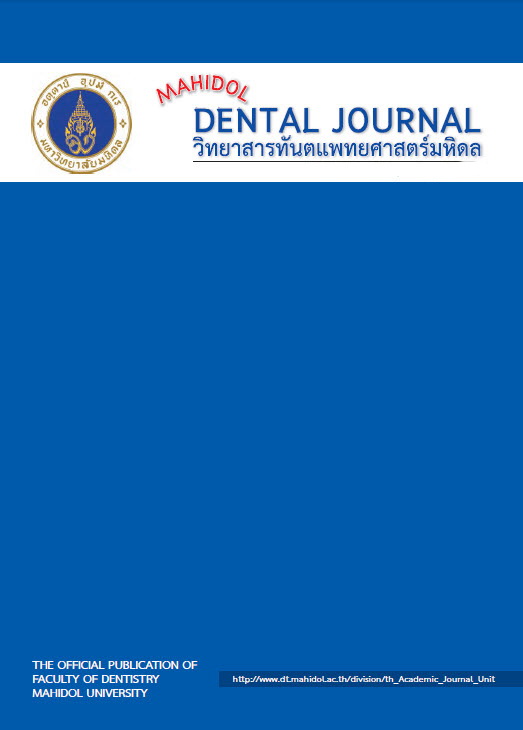Prerequisite Courses as a Predictor of Biomedical Science Courses achievement in Mahidol Dental Students
Main Article Content
Abstract
Objective: The study investigated whether the grade received in the basic science prerequisites can predict the dental student performance in the biomedical science courses.
Materials and Methods: The data were grades of the second-year dental student of Mahidol University who completed the courses in the academic year 2014 (n = 111). The grades earned in 7 prerequisites in their first year were considered as independent variables. The dependent variables were the grades of 5 biomedical science courses in the second year requiring these prerequisites. For each basic science prerequisite, the grade was analyzed for the predictive ability of the corresponding target course using the Pearson’s correlation coefficient and the multiple regression analysis.
Results: A correlation was found between the grade received in the prerequisites and the biomedical science courses. The best predictor was Organic Chemistry prerequisite on Biochemistry (R2 = 0.554). Grades earned in prerequisite courses, i.e., Organic Chemistry, Process of Life, Physics for Medical Science, Statistics for Medical Science provided minimal predictive ability for Biochemistry Laboratory, Introduction to Genetics, Physical Principles in Life Science and Dentistry, and Biostatistics courses (R2 = 0.169, 0.197, 0.181, and 0.142, respectively). Essential Biology had no impact on Introduction to Genetics. Similarly, General Physics Laboratory and Basic Physics for Medical Science had no impact on Physical Principles in Life Science and Dentistry.
Conclusion: For Mahidol dental students, grades in some basic science prerequisites can significantly predict the success of the target biomedical science courses. Organic chemistry was the most significant prerequisite as a predictor for biochemistry.
Article Details
References
2. Formicola AJ. Preprofessional preparation for the basic science curriculum. J Dent Educ 1986; 50: 458-61.
3. Humphrey SP, Mathews RE, Kaplan AL, Beeman CS. Undergraduate basic science preparation for dental school. J Dent Educ 2002; 66: 1252-1259.
4. McCoy and Pierce. The Function of Course Prerequisites in Biology. actionbioscience. 2004.
5. Balla JI, Biggs JB, Gibson M, Chang AM. The application of basic science concepts to clinical problem-solving. Med Educ. 1990; 24: 137-47.
6. Grace JT, D’Aoust R. Evidence-based program requirements: evaluation of statistics as a required course. Nurse Educ Perspect 2006; 27: 28-33.
7. Wright R, Cortner S, Winkel A. Minimal impact of organic chemistry prerequisite on student performance in introductory biochemistry. CBE Life Sci Educ 2009; 8: 44-54.
8. Turner RC, Lindsay HA. Gender differences in cognitive and noncognitive factors related to achievement in organic chemistry. J Chem Educ 2003; 80: 563-68.
9. Creech LR, Sweeder RD. Analysis of student performance in large-enrollment life science courses. CBE Life Sci Educ. 2012; 11: 386-391.
10. Seymour E, Hewitt NM. Talking about leaving: Why undergraduates leave the sciences. 1997. Boulder CO: Westview Press.
11. Lynch C, Grant T, McLoughlin P, Last J. The relevance of basic sciences in undergraduate medical education. Ir J Med Sci. 2016; 185: 195-201.


